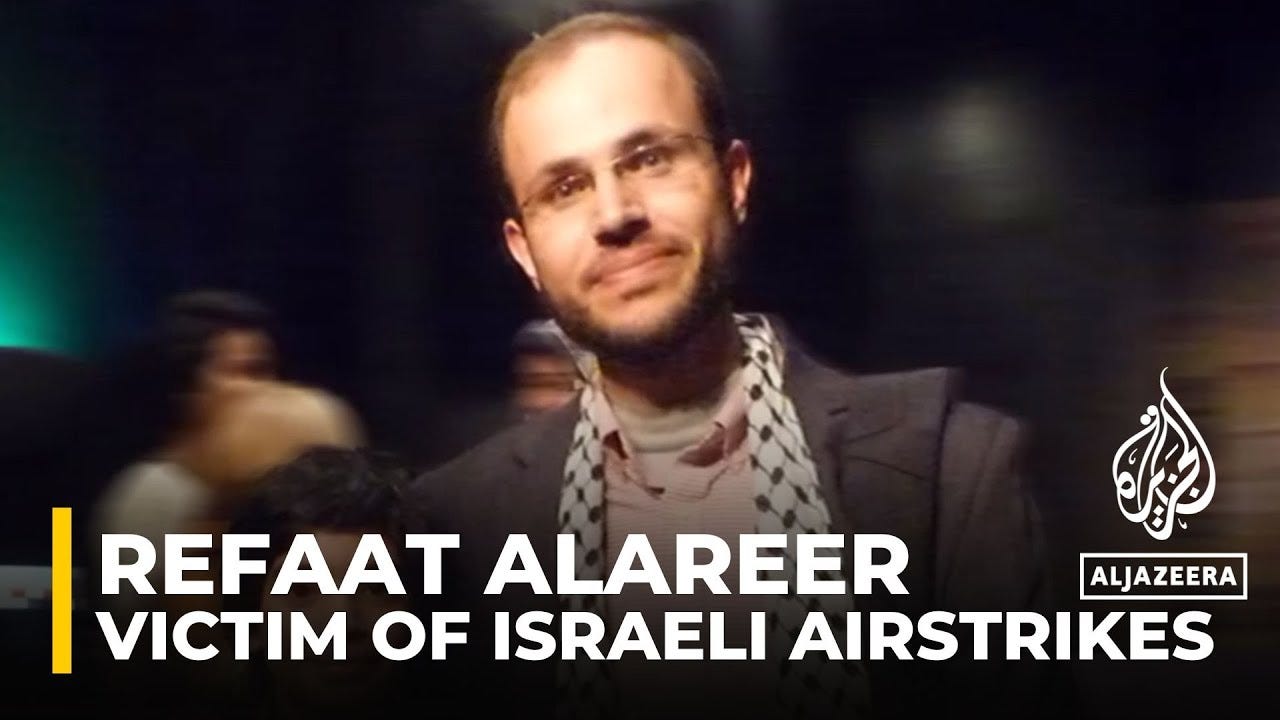Two Very Different Cancelings
Why Refaat Alareer is dead and Masha Gessen alive.
Imagine two public intellectuals, say, a literature professor (who is also a poet) and a journalist, in a time of genocide. To be more precise, our time: Israel is continuing its relentless genocidal assault on the Palestinians, and the West, led by the USA keeps helping the perpetrators – with political cover, weapons, munitions, intelligence, and by suppressing those rebelling against this complicity.
Against this background, both the literature scholar and the journalist make a comparison between what Israel is doing to Gaza and what the Nazis did to their victims, to be precise, to the Jews they forced into the Warsaw Ghetto and then murdered.
The two public intellectuals do not make exactly the same point. The journalist states that Gaza resembles the Warsaw Ghetto and that what we are seeing now is akin to the “liquidation” of that ghetto by the Germans in 1943; the professor goes farther – be it because he is more courageous or more perspicacious – and draws the logical conclusion, namely that the Palestinian Resistance from and in Gaza resembles the Jewish victims of the Nazis who fought back, famously in a last, desperate uprising in 1943.
There’s a chronological quirk: Although making the bolder as well as more consistent statement, the literature scholar spoke up in October; the journalist in December. But let that pass. It is, most likely, simply the outcome of the fact that being the victim of an atrocity sharpens the mind faster than being an outside observer.
For we are speaking, of course, of Refaat Alareer and Masha Gessen. Alareer was a Palestinian in Gaza, where he has by now been murdered, like tens of thousands of others; in his case in an especially personal manner, by the genocidal forces of fascist-Zionist apartheid Israel. Gessen is a Russian-American and Jewish intellectual based in New York.
Gessen also had a price to pay for her temerity of saying in the prestigious New Yorker magazine what many have long understood everywhere else. It makes sense to compare the Warsaw Ghetto and Gaza; and if those two places of crime and suffering are similar enough for a comparison to help us think about them, then it must also make sense to compare Nazism and the current iteration of Zionism. (Let’s set aside the history of Zionism. What matters now is its despicable present. That’s where the urgency is. Its missed opportunities, if they ever existed, are not our concern. That would be an obscene privileging of the perpetrators over the victims.)
The price Gessen paid was a bizarrely comical attempt at sort of canceling her in the particularly benighted German public sphere: With Gessen already picked for a prize named after Hannah Arendt, its sponsors then performed the new trick of simultaneously handing out the award and canceling their own awardee. The details of that shambolic affair are not important here. In essence, it involved the German Greens who love Gessen’s going after Russia, as she usually does, but not after Israel. The upshot of the dark comedy they staged around Gessen’s award is that Gessen still got it as well as much flattering publicity as a fearless truth-sayer.
She deserves some of that; she clearly enjoys it, too. It is a perfectly costless kind of martyrdom, a performance more than anything else. This may not be what she wanted initially, but it certainly is something she finds it very easy to live with.
Alareer was also canceled. But entirely. As mentioned already, the genocide forces of Israel set aside time and special effort to track and murder him. As is their style, they also killed several members of his family along with him. There is a possibility that Alareer’s social-media smearing by such luminaries as culture-war bully Bari Weiss may have helped draw attention to him, the kind of attention that comes with your very own, personal missile.
If you feel that some of the above reads rather bitter, then because it is. I second Gessen’s late attempt to bring a little realism about Israel’s crimes into even the New Yorker. I find her failure to draw Alareer’s obvious conclusion extremely revealing: Where the Palestinian intellectual could see and name the true valor of Palestinian Resistance, Gessen could not.
But what is most galling here has little to do with Gessen, at least not with what she seems to be aware of. The fact that Gessen is patted on the head for the modest heroism of speaking a fragment of truth, while still getting her award and facing no real negative consequences, while Alareer, who made the clearer, more relevant, and, probably, simply more courageous statement much earlier is dead, is not Gessen’s fault. It’s the fault of our dastardly public culture, still shot through with colonial attitudes: It simply does not matter much when the brown man gets wiped out. He is, literally, not someone who gets our attention, even when he’s murdered for saying the same thing, while going farther and under much harder conditions and at literally lethal risk, of which he was very well aware.
In fact, we won’t even notice the contrast between the two intellectuals. Failing to see him, we fail to see the obvious comparison between them and what they got for their “offense.” You still think Gessen’s fairly obvious comparison between genocidal Nazis and genocidal Zionists is such a big deal? You should see the comparison between what happened to Alareer and to Gessen for making it.




Never forget, Gessen said Russians could be defeated by sanctioning Brie cheese